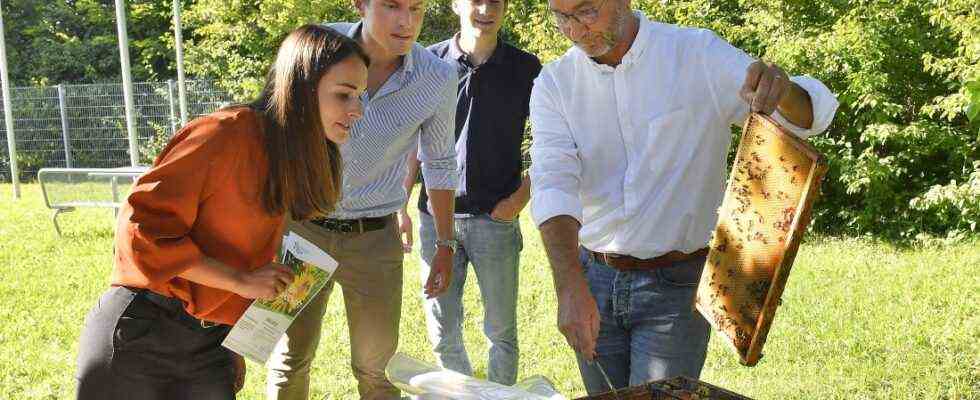In the buildings of the Gilching industrial park the employees of the companies buzz around, on the green areas next to them the employees of the queens. In the future, three honey bee colonies will live between trees, the motorway and the multi-storey car park. They have no names, but are numbered consecutively, says beekeeper Michael Ruhdorfer. At least they are not called Volk Anna or Tom, but Beeyard 1, 2 and 3. He thinks that’s appropriate, says the 55-year-old from Weßling, the hotel next door is also called “Courtyard”. And the green space behind it is now the “Beeyard”, the bee garden. He has also designed his own label for the honey.
The idea came about by chance from a conversation with the beekeeper, says Sandra Weiß. She works for the Asto Group, which manages the Asto Park industrial estate in Gilching, and, according to her colleague Thorben Fabian, is now the bee representative. The death of bees has been a big problem for years, and they want to do something about it.
Beekeeper Ruhdorfer reveals that there are around 40,000 bees in a colony. The exact counting is of course difficult. The number of bees also varies according to the season. In summer the colonies usually have 50,000 bees, in winter around 15,000. Ruhdorfer, who actually works as a mechanical engineer, practices beekeeping as a “traditional hobby”. His father had already started doing it in the 1960s, saying that he took over his passion. Now his own children are also involved, his son Simon has been helping since he was ten years old and the Beeyard people are also moving with him.
Sandra Weiß, Thorben Fabian, Simon Ruhdorfer and Michael Ruhdorfer (from left) examine the Beeyard peoples.
(Photo: Georgine Treybal)
Michael Ruhdorfer has specialized in bee sponsorships in industrial areas. When a company sponsors bees, the beekeeper looks after the colonies all year round and regularly sends out a bee journal as the sponsored children are doing. In addition, the companies receive a certificate for the environmental contribution they have made. He talks enthusiastically about the “flourishing industrial parks”, as he calls them: “I imagined the employees sitting on the park bench during their lunch break, the bees buzzing all around, just wonderful.”
In addition to two colonies in the garden for his own use – he doesn’t dare to trust more because of the neighbors – he currently looks after 27 colonies. For example, there are a few at Gut Delling or at the Holländer country nursery in Weßling. “I’ve always asked myself whether I could make a living from beekeeping, but there’s not enough going on,” says the mechanical engineer. He is now working with the Society for Economic and Tourism Development in Starnberg (GWT), which also sells his honey. He is currently in the process of organic certification, and the numbering of the peoples is also important. He hopes for the certificate in May 2022.
The honey even has its own label.
(Photo: Georgine Treybal)
This year has been a tough one for the bees. The colonies received more sugar syrup than the beekeeper could harvest honey. “Otherwise they would have starved to death.” Ruhdorfer is safe in dealing with his peoples. Without a protective suit, he stands in front of the beehive on the beeyard and holds the smoker, a vessel from which smoke rises, to the exit. “Now the bees are thinking, whoops, the forest is on fire.” They would now eat themselves full of honey. The advantage: when the honey bladder is full, they no longer sting. “When I work with the smoker, I don’t need a protective suit.” He finds beekeeping most fun at the so-called bilge, the end of winter dormancy and the beginning of the breeding season. The bees do not make a bilge, but rather fly in an average radius of up to three kilometers. You think economically, that is the radius that pays most off the workload.
Sandra Weiß and Thorben Fabian from the Asto Group are very satisfied with the project. “We hope to find more comrades-in-arms in the industrial park,” they say. You have sent a circular to all tenants and have already received some positive feedback. “The bee is such an important livestock that we hope that even more companies will get involved.” The fact that the beehives are right next to the motorway doesn’t bother the insects, says Ruhdorfer. If only the beekeeper. He once read a quote: “If the bees die, then humans have four years to live.” That would motivate him to keep committed to her. “To a buzzing future,” agrees Thorben Fabian. The bees from the Beeyard are already buzzing to themselves and collecting flower nectar. The “flourishing industrial park” Gilching will therefore be much more colorful next spring.

